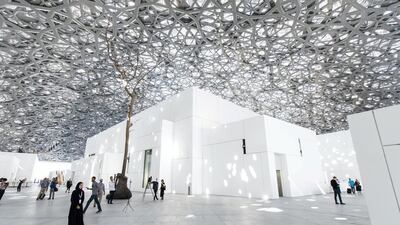Last year, when we collectively achieved the milestone of opening Louvre Abu Dhabi to a global audience, we became home to one of the world’s most important museums.
Today, just six months after the Louvre Abu Dhabi first opened its doors, the world is marking International Museum Day, a call for renewed celebration.
The museum’s architectural credentials alone brought people from far and wide just to marvel at Jean Nouvel’s undoubted masterpiece.
That said, the messages of Louvre Abu Dhabi strike a more important note than the building and its magnificent dome of light. The museum was able to traverse cultural divides by following a specific remit – to dissolve geographical and temporal compartments and to present human history as a linear and singular movement.
This is a world first and was something that was of primary importance for us at the Department of Culture and Tourism - Abu Dhabi when conceptualising this universal institution.
A little over 60 per cent of the visitors to this museum are first-time visitors in the UAE. Some are getting their first impression of this country through the Louvre Abu Dhabi and understanding that we want to spread a message of peace, acceptance and mutual understanding by highlighting commonalities rather than our differences.
Through Louvre Abu Dhabi, we reinforce our commitment to promoting acceptance and tolerance, as well as pledging to safeguard and preserve cultural heritage for ourselves and for generations to come.
___________________________
Read more from Opinion:
___________________________
International Museum Day was established by the International Council of Museums (ICOM) in 1977 to raise awareness of the role museums can play in knowledge exchange, enriching cultures and developing mutual understanding, cooperation and peace among people.
This year, under the theme of hyper-connectivity, new approaches and new publics, Louvre Abu Dhabi is precisely aligned with this vision. It goes beyond world-famous museums. The UAE government is committed to increasing awareness of the nation’s history and heritage on a micro as well as a macro level. The oldest museum in the UAE is the Al Ain National Museum, established in 1969 under the guidance of the UAE's Founder Sheikh Zayed.
Charting the history of Al Ain from the Stone Age through to the foundation of the UAE in 1971, the museum houses artefacts from archaeological sites across the region.
In many ways, this institution is as important as Louvre Abu Dhabi, serving as it does to stimulate pride in the UAE’s national history and culture.
We preserve this institution in equal measure to Al Ain Palace Museum, the renovated palace of Sheikh Zayed, dating back to 1937. At the same time. the Department of Culture and Tourism – Abu Dhabi focuses on heritage sites such as Al Jahili Fort and Qasr Al Muwaiji, all of which are part of increasing societal awareness of the importance of history, heritage, arts and culture.
It is for this reason that International Museum Day should be celebrated and honoured. When we see a government committed to building a strong nationwide cultural foundation through museums, we can anticipate a positive future.
Ultimately, this will not only enrich the minds and sensibilities of our multinational public but will also have a direct impact on the economy.
The greater investment that the country puts into culture and arts through the development of museums and other institutions, the greater our ability to grow and mature as a country and firmly claim our place as a global epicentre of production, innovation and culture.
Mohamed Khalifa Al Mubarak is the chairman of the Department of Culture and Tourism – Abu Dhabi

